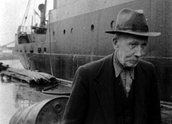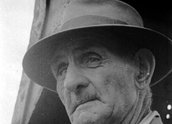

Pensions for Veterans (1953)
Synopsis
This documentary, made by the Waterside Workers’ Federation Film Unit, advocates pensions for waterside veterans. It depicts the hardships that many workers have faced and highlights some of the health and safety concerns raised in a 1945 report on the conditions of waterside workers (clip two). Other sequences include a trip to Canberra to lobby Federal Parliament about the poor health of waterside veterans. The film uses an orchestral score and contains voice-over narration by Jock Levy, one of the filmmakers.
Curator’s notes
'Surely it is this nation’s responsibility to see that these men spend their remaining years with decency and dignity … the nation owes them a debt. It is for you to see that that debt is paid’. These are the emotional closing lines of Jock Levy’s narration for Pensions for Veterans, a vivid depiction of the plight of aged waterside workers. This film was made as part of the 1953 campaign to secure pensions for these workers after the Secretary of the Sydney Branch of the WWF, Tom Nelson, approached Levy. Levy and Keith Gow made the film based on an outline that was approved by members of the federation, and all the men who appear as extras are waterside workers or members of affiliated unions. The film was shot over four weeks and was a collaboration between Jock Levy, Keith Gow and Norma Disher who formed the Waterside Workers’ Federation Film Unit. According to the Maritime Union of Australia, this is the only union in the world with a film unit.
Pensions for Veterans builds a persuasive case for rewarding retired waterside workers but also provides a first glimpse of the film unit’s developing broader agenda – to depict labour history from the point of view of the workers. Levy noted in the John Hughes documentary on the Waterside Workers’ Federation Film Unit, Film-work (1981), that most 1950s mainstream newsreel images of workers were negative. Part of the unit’s aim in making films like this (see also The Hungry Miles and November Victory, both 1955), was to offer an alternative view of workers as forming the foundations on which the nation’s wealth is created. Levy also noted that while Pensions for Veterans was designed to screen to a trade union audience, the filmmakers aimed for it to gain broader exposure amongst the general public. The campaign to receive pensions was finally won in 1967.
The film uses cinematic techniques drawn from a variety of influences, the most obvious being the Soviet montage and social realist traditions. An effective use of orchestral score contributes to the vivid dock sequences with their images of toil and repetition. The narrative style shifts between propaganda and poetic reflexivity but also details crucial facts. The repetition of certain words and phrases draws out the thematic elements. As with the rest of the film unit’s output, each shot is carefully framed and sequences are planned to convey maximum dramatic effect.
The Waterside Workers’ Federation Film Unit made over a dozen films between 1953 and 1958, some of which were produced for other unions (see The Bones of Building, 1956, for the Builders Workers’ Industrial Union and Hewers of Coal, 1957, for the Miners’ Federation). Jock Levy, Keith Gow and Norma Disher worked on all of the films in collaboration with union members. Disher’s involvement in Pensions for Veterans was voluntary, while Levy and Gow were paid wages equivalent to those of the wharfies. It wasn’t until The Bones of Building (1956) that Disher came on board in an official capacity. All three filmmakers had a background in the New Theatre in Sydney and were interested in using film and theatre for social or political purposes. The Waterside Workers’ Federation Film Unit represents an important part of independent filmmaking in this country and, like the Realist Film Unit operating in Melbourne during the 1940s and 1950s, contributes to the tradition of left-wing filmmakers recording the struggle of the working classes.
Fighting Films: A History of the WWF Film Unit (2003, Pluto Press) was written by academic Lisa Milner based on her PhD research into the WWF Film Unit. The book was jointly funded by the Maritime Union of Australia, the Construction Forestry Mining Energy Union (Mining and Construction Divisions) and the Australian Manufacturing Workers’ Union. To coincide with the publication, the MUA released a three-DVD compilation featuring 13 of the WWF Unit’s films as well as John Hughes’s documentary Film-work (1981).
Pensions for Veterans first screened at Leichhardt Stadium on Tuesday 3 November 1953 to an audience of thousands of wharfies.
- Overview
- Curator’s notes
- Video 2 clips

- Principal credits
- Find a copy
- Make a comment
- Add your review



